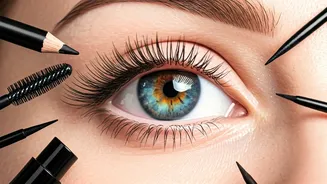Makeup Application Risks
Applying makeup, especially around the eyes, presents various potential risks to your vision. Products like eyeliner and mascara are used in close proximity
to the eyes. The risk of contamination increases when these products come into contact with the eyes. If makeup applicators are not cleaned regularly, they can harbor bacteria and transfer it to the eyes, leading to infections. Similarly, sharing makeup tools is a common way to spread eye infections, such as pink eye (conjunctivitis). Additionally, the use of expired makeup products can lead to the growth of harmful bacteria, causing irritation or more serious eye problems. It is vital to pay close attention to the expiration dates of makeup and ensure the cleanliness of all applicators and brushes to avoid these risks. Choosing hypoallergenic or ophthalmologist-tested products can further reduce the chances of irritation and infection, making the daily application safer for your vision.
Lens Usage Hazards
Contact lenses, while offering convenience, have specific risks that necessitate caution for eye health. One significant concern is improper hygiene. Contact lenses, if handled without clean hands, can easily transmit bacteria and increase the risk of eye infections. Sleeping in contact lenses, even if they're designed for extended wear, can deprive the cornea of oxygen, increasing the chance of infection and other complications. Overwearing lenses, exceeding the recommended wear time, or failing to replace them as scheduled can also lead to similar issues. Another critical aspect involves the care and storage of lenses. Using tap water to rinse or store lenses can introduce microorganisms that can damage the eyes. Contact lens solutions, specifically designed for cleaning and disinfection, are crucial, but only when used properly. Regular eye exams and following your eye doctor's instructions are essential to identify and address any potential problems early on, ensuring continued comfortable and safe contact lens use.
Habitual Eye Irritations
Certain daily habits exacerbate the potential risks associated with makeup and contact lenses. Rubbing your eyes, particularly if you're wearing makeup or lenses, is a common habit that can introduce irritants or bacteria. This mechanical action can scratch the cornea or displace the lenses, causing discomfort and potential damage. In addition, the practice of applying eye makeup on the inner waterline of the eye is often linked to an increased likelihood of inflammation, as the pigments can obstruct the meibomian glands. These glands produce oils that maintain healthy tear film. Similarly, incorrect removal of makeup, such as leaving mascara residue overnight, can lead to chronic irritation and infection. It is also important to consider the environmental factors such as wind and excessive exposure to sunlight, which can increase the dryness of the eyes and make them more vulnerable to the negative impacts of makeup and contact lenses. Being mindful of these habits and adopting better practices can greatly reduce the risks associated with daily eye health care.
Protecting Your Eyes
Taking proactive steps can help you safeguard your eye health while continuing to use makeup and contact lenses. Prioritizing meticulous hygiene is crucial. Always wash your hands thoroughly before handling lenses or applying makeup, and make sure your applicators are consistently cleaned and sanitized. Regularly replacing makeup products, especially mascara and eyeliner, which have a shorter lifespan, is also vital to reduce bacterial contamination. Additionally, choose hypoallergenic or ophthalmologist-tested makeup to minimize the chances of irritation. When it comes to contact lenses, make sure to follow the prescribed wearing schedule and proper care routines. Consult your eye care professional for regular check-ups to monitor your eye health. These proactive measures can help to ensure that you enjoy the benefits of makeup and contact lenses with minimal risk to your precious eyesight. Ultimately, informed choices and responsible habits are key.














